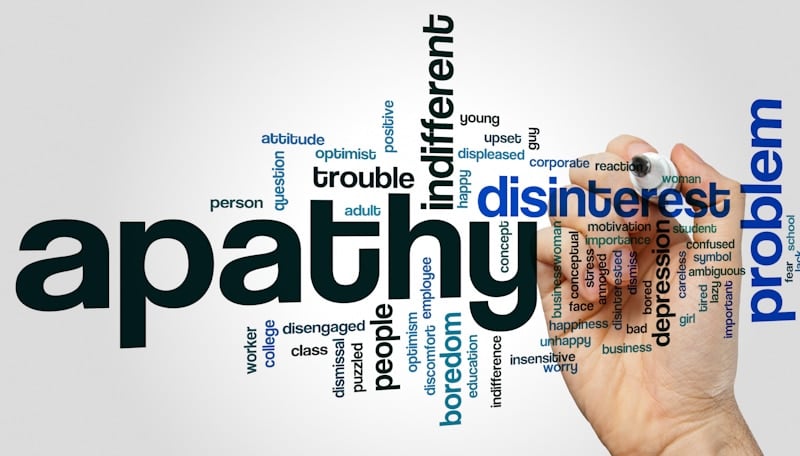It’s pretty normal not to be interested in certain things in life. But when that lack of concern or initiation is toward something deemed “important”, the disinterested attitude or demeanor cannot be considered “normal”. And such an approach toward things in life is referred to as “apathy”.
“Apathy” denotes any behavior that “exhibits zero energy or interest in things” or “the unwillingness to do a thing or take action”. Use the term in your texts to denote inaction toward something important, or the lack of responsiveness is conspicuous or could affect the subject or someone else.
Read on to learn more details about the term, the various forms of the word, how to use them all in your texts, and lots more. If you thought “apathy” is just a state of mind, you might want to read this.
“Apathy” – Meaning
The term “apathy” denotes “the lack of feeling or emotion”. If you don’t care about your grades as a student, you’re showcasing “apathy” or are being “apathetic” toward academics. “Apathy” could cause a person to lose their job, a relationship(s), not enjoy their life, etc.
“Apathy” becomes apparent or gets noticed when one is expected to respond or should be exhibiting emotion or interest in a given situation. “Lack of passion”, “a puzzled approach toward things”, etc., are characteristics identified with “apathetic” individuals.
“Apathetic” is the adjective form of the word. “Apathetically” is the adverb variant. “Apathetical” is the same as “apathetic” but not a very commonly used term. “Indifference”, “impassiveness”, “impassivity”, “emotionlessness”, “insensibility”, etc., are words closely related to “apathy” in meaning.

The Term’s Origin
“Apathy” is rooted in Greek term from the late 16th century, “apatheia” – which itself was derived from the adjective “apathes” that means “without feeling”. “Apathes” is also inspired terminology that’s linked with “pathos”, meaning “emotion”. “Pathos” incidentally is behind quite a few other words, such as “empathy”, “antipathy”, “pathetic”, “sympathy”, and “pathematic” (which means “emotional”).
What Does Science Say About “Apathy”?
In the medical world, “apathy” is considered a brain-behavior disorder. It is an aspect of several neurogenerative conditions and neuropsychiatric behaviors. Although defined as “being emotionless” initially, “apathy” likely disrupts the brain’s motivation processes.
According to advanced neuroscience studies, “apathy” is the motivation-action-reward pathway. It entails prefrontal cortical areas – including the ventromedial prefrontal cortex, anterior cingulate, basal ganglia (especially ventral structures), and the dopaminergic arrangement.
The frontal “corticobasal loop” assesses motivation and reward, appraises the stimuli, makes a choice of action, and hires other action regions. Studies have only started to connect apathy to genetic alterations and mutations. Future studies could further elucidate the underlying genetic and neural mechanisms of it.
Is “Apathy” a Medical Condition?
As explained above, “apathy” has quite a bit to do with the brain. But does that classify it as a “medical disorder”?
Everybody goes through apathy at some point in time. You could at times feel uninterested in or unmotivated to carry out routine tasks. Such situational apathy is quite normal. But when “apathy” becomes a part of you or your personality trait, it’s a problem.
“Apathy” could be a sign of multiple psychiatric and neurological disorders. It could be a syndrome and can turn into something significant if you do not care much or do not treat the condition.
Diseases such as Alzheimer’s disease, Parkinson’s disease, stroke, schizophrenia, vascular dementia, etc., could be at the root of apathy. Pharmacological interventions, however, may not be beneficial with apathy.
“Apathy” and Politics
The word “apathy” is used quite extensively in political contexts. It plays a major role in democracy theories that stress citizens’ involvement in public affairs. It indicates “waning social capital” and “cognitive mobilization”. Citizens interested in politics have more political knowledge and are more active compared to the “apathetic” crowd.
According to research studies carried out in different regions, most people are not attentive to the public state of affairs – except during national emergency periods. Such “apathy” is worrisome not just to politicians but also to journalists and academicians.
Multiple factors affect or contribute to this political apathy – including age, gender, education, and political dispositions. Civic education’s rebirth could create or boost people’s political attentiveness in several societies.

Using the Word “Apathy” in Texts
The noun “apathy” is typically used in texts to state people’s inaction or indifference to things considered important. Here are a couple of sentences illustrating that:
- The people showed surprising apathy toward those important social issues.
- The youth exhibited apparent apathy toward some of the burning political problems.
For any abstract noun like “apathy” to fit seamlessly into a sentence, preposition usage is key. “Apathy” usually uses the words “of”, “towards”, etc. Here are a few sentences incorporating “apathy” with the prepositions:
- It is the company’s responsibility to ensure the customers don’t exhibit or even feel apathy toward their offerings.
- The apathy of the country’s people toward all things politics is a serious problem.
As mentioned above, “apathy” has both the adjective and adverb forms. And the same prepositions may get used with the variant terms as well. The following are a few sentences incorporating the same:
- As she was apathetic about finishing her schoolwork, she graduated late.
- She looked at them all apathetically.
- He cast his vote apathetically – with zero clue about the party he voted for and the overall political climate.
Since “apathetical” is also the adjective form of “apathy”, sentences that use “apathetic” can replace the word with “apathetical”. For example:
- After retiring from the real estate business, his state was quite apathetic/apathetical.
- When music, literature, or art needs support, most people usually get flighty or apathetical/apathetic.
- But she was strangely apathetical/apathetic.
- Do not be apathetic/apathetical.
Example Sentences with the Term “Apathy”
The following is a relatively long list of sentences using the word “apathy”:
- How can one overcome voter apathy?
- Some members of the team were quite clearly exhibiting apathy during the meeting.
- If the outcome is apathy everywhere, they should take responsibility for it.
- While her trust as the prime minister has slightly dipped, her approval rating is not expected to fall steeply, thanks to the vast political apathy among the majority of the people.
- Most of them were interested in the discussion, and their apathy quite clearly showed.
- Her apathy just made him even more annoyed.
- Jenna’s apathy requires some stimulation.
- After his election loss, the health community and the general public fear his apathy for the medical and financial health of his people would reach greater heights.
- The campaign failed due to public apathy.
- More research that confirms apathy as a risk factor for dementia can help with finding the best way to target preliminary dementia interventions going forward.
- Such attitudes would only result in apathy.
- Fury is invariably followed with apathy.
- After several decades of political apathy, the youth of the country were compensating for the lost time.
- Such apathy indicates the under-investment in preventive medicine and health education in the country.
- It yielded apathy, inefficiency, and disunity – three things that were missing in action the entire time in the region.
- Political ignorance and public apathy are readily apparent in almost all countries across the globe.

Here are a few sentences incorporating the term “apathetic”:
- She was increasingly growing apathetic and depressed.
- He was so apathetic; he didn’t even care to move.
- The youth is apathetic about politics.
- An apathetic mindset won’t take you anywhere in life.
- Even the helplessly apathetic people were sitting up and taking notice.
- Her parents are apathetic about her education and future.
- At times, she feels apathetic and exhausted.
- I asked him to take care of my daughter while I was gone briefly. But I got a first-hand account of his apathetic approach once I saw all the mess in the house upon returning.
- Because Jim believed he was good at the sport than everybody else in the class, he was quite apathetic about practicing before the event.
- To be a part of the jury, you should be apathetic toward the crime.
- She was apathetic about marriage.
- The customer service personnel’s apathetic attitude toward customers was evident in how she interacted with them on the phone.
- At times, it feels the world is filled with uncaring, apathetic people.
- She spent too much of her time coasting and being truly indifferent and apathetic.
As stated before, the above sentences can use “apathetical” in place of “apathetic”.
The term “apathetically” is not as commonly used in texts as “apathy” or even the adjective “apathetic”. But since it’s a valid word and the need to incorporate it in texts may arise, here are a few sentences using the adverb:
- The students were back to school unenthusiastic, attending the classes apathetically.
- He waved his hand to the crowd apathetically and continued rowing.
- At first, she was listening to the story apathetically. After some time, however, she developed an interest and became keen.
- Newsreaders are expected to deliver current information apathetically, irrespective of the myriad emotions the news being delivered may create in them.
Conclusion
“Apathy” is quite deep-rooted. It’s more than just “a state of mind”, with possible origins in certain diseases, as mentioned above.
In texts, “apathy” is usually used in the political context – and not much in medical or health-related writeups. If you are writing a piece on medicine and health, use a more medical or context-appropriate term instead of “apathy”.
To conclude, it’s not advised to be “apathetic” towards things that matter to you and society. If you realize the same but cannot do anything about it by yourself, get help.
Shawn Manaher is the founder and CEO of The Content Authority. He’s one part content manager, one part writing ninja organizer, and two parts leader of top content creators. You don’t even want to know what he calls pancakes.

